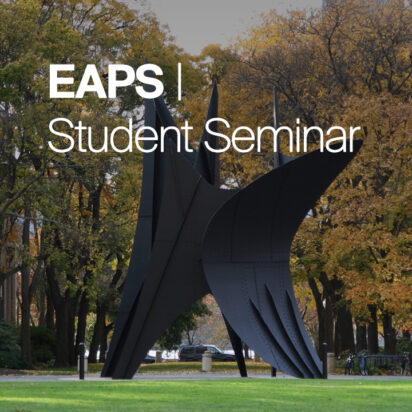
[ESAC Seminar] Jo Hickman
Date: Thursday, March 20, 2025 Time: 12:00 - 1:00pm Location: 54-209 M. Nafi Toksöz Seminar Room | MIT Campus, Cambridge, MA“Novel Protist & Pennate Diatom Association Under Temperature Stress”
Parasitic protists can spread rapidly through phytoplankton populations, impacting algal bloom dynamics and redirecting carbon flow in the marine food web. Our understanding of this process is limited, particularly in how these interactions vary across climates and in warming ecosystems. Specifically, the physiological response of diatoms to protist infection has not been adequately studied. We investigated how a novel protistan parasite impacts two pennate diatom genera under a warming scenario to understand host-parasite dynamics during algal blooms and how these interactions may be impacted by climate change. We hypothesized that infection will negatively impact diatom host population and physiology and expected both host density and parasite prevalence to decline under temperature stress.
We coisolated a zoosporic parasite from the Scotian Shelf in September 2023 and infected pennate diatoms, Asterionella sp. and Thalassionema sp. Parasitism and temperature impacts on diatoms were assessed by growing infected and uninfected cultures at 15°C and 22°C to simulate thermal optimum and predicted warming scenarios, respectively. A novel automated micrograph analysis pipeline was designed to predict infection dynamics, which revealed an increase in infected host cells as host populations approached stationary phase. While infection alone did not significantly alter host physiology or population density, heightened infection prevalence at optimal temperatures implies a temperature-dependent infection dynamic (i.e. high temperatures inhibit infection). Increased temperatures negatively impacted both members of the symbiosis, raising important questions about how these systems will respond to a changing climate and increasing sea surface temperatures. These data illuminate important characteristics of a novel host-parasite system, with implications for diatom community responses to climate change, top-down control from predation, and, consequently, marine carbon flow.
This talk will be given at the Association for the Sciences of Limnology and Oceanography (ASLO). I look forward to you feedback, suggestions, and questions!
ESAC Student Seminar Series —
A forum for students and postdocs to share recent research, hone presentation skills, and build community among peers, sponsored by the EAPS Student Advisory Committee. Open to current EAPS graduate and undergraduate students and postdocs. Typically hosted on Thursdays during the semester, including pizza lunch.
Contact: esac.officers@gmail.com
